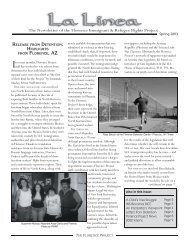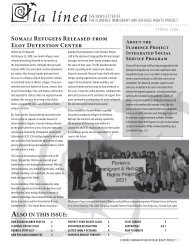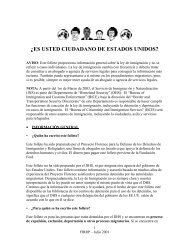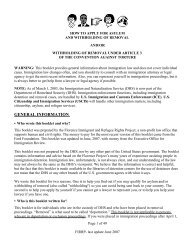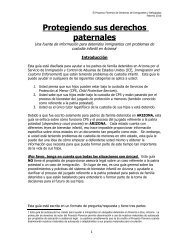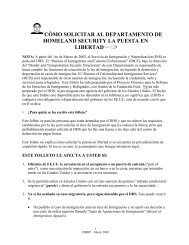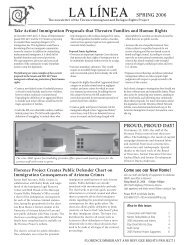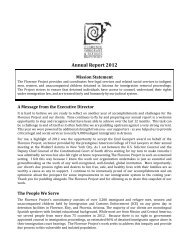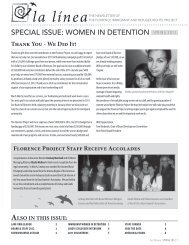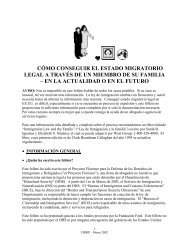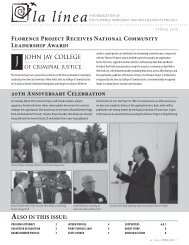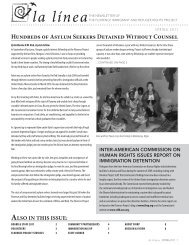quick reference chart and annotations for determining immigration ...
quick reference chart and annotations for determining immigration ...
quick reference chart and annotations for determining immigration ...
Create successful ePaper yourself
Turn your PDF publications into a flip-book with our unique Google optimized e-Paper software.
Immigrant Legal Resource Center, Florence Immigrant <strong>and</strong> Refugee Rights Project,<br />
Maricopa County Public Defender August 2012<br />
1003(B). These arguments have not been recognized by any court <strong>and</strong> have been rejected in an<br />
unpublished Ninth Circuit decision. See B<strong>and</strong>a-Montoya v. Holder, 07-74794, 2011 WL 3555891 (9th<br />
Cir. Aug. 12, 2011) (finding that Arizona <strong>and</strong> federal definitions of conspiracy contain the same<br />
elements). There<strong>for</strong>e, defense counsel should conservatively advise clients that a conviction <strong>for</strong><br />
conspiracy will have the same consequences as a plea to the principal offense.<br />
Crime Involving Moral Turpitude (CMT): Conspiracy to commit a CMT is a CMT. See, e.g.,<br />
McNaughton v INS, 612 F.2d 457 (9th Cir. 1980); but see “Summary.”<br />
Aggravated Felony: Conspiracy to commit an aggravated felony is an aggravated felony. 8<br />
USC § 1101(a)(43)(U); but see “Summary.”<br />
Other Grounds: Domestic Violence: Most grounds of inadmissibility <strong>and</strong> deportability<br />
specifically list conspiracy to commit the offense. The domestic violence deportation ground does not,<br />
however. See 8 USC § 1227(a)(2)(E). There<strong>for</strong>e a plea to conspiracy to commit a “crime of domestic<br />
violence,” stalking, or a crime of child abuse, neglect or ab<strong>and</strong>onment arguably prevents deportability<br />
under that particular ground. The conviction still will likely be a crime involving moral turpitude or an<br />
aggravated felony, if the principal offense is. See “Note: Domestic Violence.”<br />
. Facilitation, A.R.S. §13-1004<br />
A person commits facilitation if, acting with knowledge that another person is committing or intends to<br />
commit an offense, the person knowingly provides the other person with means or opportunity <strong>for</strong> the<br />
commission of the offense.<br />
Summary: A conviction <strong>for</strong> “facilitation” will likely subject the defendant to removability <strong>for</strong> a<br />
“theft offense,” as well as other grounds of removability. See discussion of Duenas-Alvarez, below.<br />
However, because it reduces the potential sentence, facilitation can help prevent a person from becoming<br />
removable <strong>for</strong> CMT.<br />
Crime Involving Moral Turpitude (CMT): Criminal defense counsel should assume that<br />
facilitation will be a CMT if the principal offense is. However, facilitation carries a lower potential<br />
sentence. There<strong>for</strong>e a person with a single CMT conviction may be able to avoid deportability or<br />
inadmissibility. See CMT discussion at 1. Attempt, supra.<br />
Aggravated Felony: Counsel should assume that conviction of facilitating an offense that is an<br />
aggravated felony will be held an aggravated felony, because aiding <strong>and</strong> abetting is. Facilitation should<br />
only be considered if solicitation is not available <strong>and</strong> the only other alternative would be to plead to a<br />
straight aggravated felony.<br />
Facilitation is likely to have the same adverse <strong>immigration</strong> effect as does aiding <strong>and</strong> abetting. In<br />
Gonzales v. Duenas-Alvarez, 127 S. Ct. 815; 166 L. Ed. 2d 683 (2007), the Supreme Court overturned<br />
previous Ninth Circuit precedent <strong>and</strong> held that the generic definition of theft includes the offense of<br />
aiding <strong>and</strong> abetting. This holding will be applied to aggravated felonies other than theft as well. The<br />
Ninth Circuit has also held that the federal definition of “facilitation” is equivalent to that of “aiding <strong>and</strong><br />
abetting.” United States v. Jimenez, 533 F.3d 1110, 1114 (9th Cir. 2008). Under Arizona law,<br />
“facilitation” is commonly used by prosecutors to charge a person as an aider <strong>and</strong> abettor rather than as a<br />
principal. See Arizona v. Harris, 134 Ariz. 287, 288, 655 P.2d 1339, 1340 (App. 1982); Arizona v. Gooch,<br />
139 Ariz. 365, 367, 678 P.2d 946, 948 (Ariz. 1984). While <strong>immigration</strong> attorneys can argue that, like<br />
Arizona Criminal Chart with Explanatory Endnote – August 2012<br />
15



